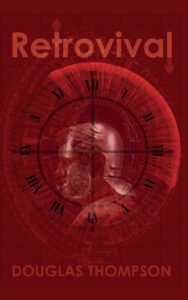Retrovival by Douglas Thompson (book review).
At the centre of some books there is a good, original idea. What is important is the way this is used. That is not just down to the skill of the writer but also the other ideas that surround it. The heart of ‘Retrovival’ is a technique that has been developed that can retrieve the memories from a long-dead brain and display them as images.
Set in an independent 2089 Scotland, the process, which involves flooding the tissue with Smart Blood, has been developed as an archaeological tool. The well-preserved bodies of two Romans are discovered in a bog near the remains of the Antonine Wall, which was built between the Firths of Forth and Clyde in AD 142. An accident happens, details of which are very sketchy, resulting in the centurion’s corpse being reanimated. He escapes from the facility and wanders around the countryside looking for his barracks.
The exploration of the two timelines and the confusion Caius the centurion experiences are well handled, but what could be a very effective story tends to be subsumed in politics. Anything could happen in the future. This one predicts that after Scottish independence, the conditions in England deteriorate into chaos. There is no suggestion that these are linked, resulting in the English trying to cross the border into Scotland and seek refugee status. Meanwhile, the Scots have elected a president who is portrayed as a female version of Trump. She has built a fence across Scotland and turns a blind eye to the border guards killing those trying to breach it. If this is supposed to echo the Antonine Wall, the analogy doesn’t quite work, as the Scottish tribes did not particularly want to invade England, whereas the president invades Northumberland in this book, and it is generally thought that the Antonine and Hadrian Walls doubled as customs posts.
Often, it is little things that take the reader out of a book and change expectations. There is a prologue in which a Roman soldier, probably intended to be Caius, in AD 142 and a border guard in 2088 have similar dreams of seeing each other on opposite sides of a glass wall. While this could be an intriguing notion that is never really explored, the problem is that the Roman claims that glass is a new invention, whereas it had been around since 3500 BCE, and the Romans developed glassblowing around 100 BCE and by 100 AD had become cheap enough for the ordinary Roman to own pieces. The question is more about whether the Romans would recognise the transparent barrier between the two warriors as glass.
I have objections to the Scots being labelled ‘dangerous blue-painted savages’. Even if this is supposed to be the opinion of the centurion, in the context of the book it is reinforcing stereotypes that current thinking believes are probably wrong. It may be nit-picking, but there is a difference between barbarians and savages. Barbarians, like the northern tribes, had their own cultures; savages don’t.
There is an unfortunate, but too real, brutal streak running through this book. It manifests most strongly in the first chapter with Lachlan, the border guard, and his attitude to the English and his compunction about killing those who try to cross the border. This sets a tone for the book which might not be the author’s actual intention, especially as Lachlan is only referred to in passing in the rest of the volume. Later, the prejudice comes out again very strongly when Trevor, the English archaeologist, is driven out of a pub, has his house targeted by graffiti, is victimised in the press and is imprisoned.
On a stylistic point, it is very off-putting and frustrating to have all the dialogue in italics. It makes it very difficult to attribute speech. There are other issues with this book, both factual and stylistic. It is a shame that a good idea has been suffocated by a plotline that does not really work.
Pauline Morgan
October 2025
(pub: Elsewhen Press, Dartford, Kent, UK, 2025. 234 page paperback. Price: £12.00 (UK). ISBN: 978-1-915304-67-4).
check out website: https://elsewhen.press/index.php/catalogue/title/retrovival/


